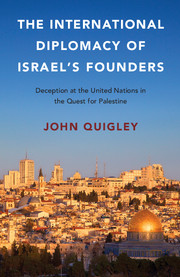 The International Diplomacy of Israel's Founders
The International Diplomacy of Israel's Founders Published online by Cambridge University Press: 05 January 2016
The United Nations remained in the picture, but, having given up first on partition, and now on trusteeship, it would assume a reduced role. The Jewish Agency, now operating as the State of Israel, benefited from disinclination on the part of the major powers for any on-the-ground involvement that might have stemmed the expulsions. On May 15, 1948, the first day after the declaration of Jewish statehood, military forces of the Arab League entered Palestine, vowing to stop the expulsions and to restore order. Egypt's foreign minister justified the Arab League troop entry in a statement to the Security Council. “The Royal Egyptian Government declare, now that the British Mandate in Palestine has ended, that Egyptian armed forces have started to enter Palestine to establish security and order in place of chaos and disorder which prevailed and which rendered the country at the mercy of Zionist terrorist gangs who persisted in attacking the peaceful Arab inhabitants, with arms and equipments amassed by them for that purpose.” The foreign minister elaborated. “Horrible crimes, revolting to the conscience of humanity, have been perpetrated by these Zionist gangs.” Invoking the concept that had been used at the Nuremberg trials in Germany, he called these acts “crimes against humanity” and said that it was Egypt's duty “as a Government of an Arab State and a civilized nation to intervene in Palestine with the object of putting an end to the massacres raging there and upholding law and principles recognized among the United Nations.” He said that the troop intervention “has no other object in view except the restoration of security and order to Palestine particularly after the British Mandate has ended, and until a just and equitable solution is reached.”
China, as a Security Council member, found the Egyptian analysis persuasive. On the day after the declaration of Jewish statehood, China challenged the Jewish Agency, blaming it for a breakdown of order in Palestine. In a reference to the efforts toward establishing a trusteeship, China criticized the statehood declaration, saying, “The prompt proclamation of the Jewish state last evening reduced considerably the prospects of peace in Palestine.”
Shabtai Rosenne was the Jewish Agency's chief lawyer. Rosenne, writing some years later, derided the Arab League explanation for its entry into Palestine.
To save this book to your Kindle, first ensure no-reply@cambridge.org is added to your Approved Personal Document E-mail List under your Personal Document Settings on the Manage Your Content and Devices page of your Amazon account. Then enter the ‘name’ part of your Kindle email address below. Find out more about saving to your Kindle.
Note you can select to save to either the @free.kindle.com or @kindle.com variations. ‘@free.kindle.com’ emails are free but can only be saved to your device when it is connected to wi-fi. ‘@kindle.com’ emails can be delivered even when you are not connected to wi-fi, but note that service fees apply.
Find out more about the Kindle Personal Document Service.
To save content items to your account, please confirm that you agree to abide by our usage policies. If this is the first time you use this feature, you will be asked to authorise Cambridge Core to connect with your account. Find out more about saving content to Dropbox.
To save content items to your account, please confirm that you agree to abide by our usage policies. If this is the first time you use this feature, you will be asked to authorise Cambridge Core to connect with your account. Find out more about saving content to Google Drive.